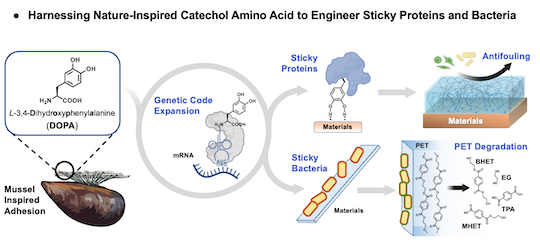Researchers at Rice University have created bioengineered microbes with strong adhesion that have the potential to revolutionize environmental cleanup by drawing on nature's genius for adhesives, the sticky power of mussels.
 The engineered bacteria were designed using genetic code expansion technology, incorporating a natural amino acid called 3,4-dihydroxyphenylalanine. Image Credit: Mengxi Zhang/Rice University.
The engineered bacteria were designed using genetic code expansion technology, incorporating a natural amino acid called 3,4-dihydroxyphenylalanine. Image Credit: Mengxi Zhang/Rice University.
Their discovery provides a potential new method for combating plastic pollution by combining this increased sticking force with an enzyme that breaks down hazardous polymers. The study, published in the journal Small Methods, may also reduce biofouling, resolving issues that have long existed in the transportation and medical sectors.
The Environmental Protection Agency estimates that the United States produces 40 million tons of plastic waste yearly, of which 64% is made of polyethylene terephthalate (PET). Plastics like PET, frequently used in packaging, are infamously difficult to break down and take generations to do so.
The team produced sticky microbes and proteins that could aid in the more effective breakdown of PET in all nations.
Very excitingly, our research holds promise for addressing the growing problem of plastic pollution in the US and across the globe.”
Han Xiao, Associate Professor and Study Lead, Rice University
Xiao is also the Director of Rice’s Synthesis X Center and a Cancer Prevention and Research Institute of Texas (CPRIT) scholar.
Tackling Plastic Pollution
Using genetic code expansion technology, the modified bacteria were created by incorporating 3,4-dihydroxyphenylalanine (DOPA), a naturally occurring amino acid that gives mussels their sticky qualities. By adding DOPA to the bacteria, the researchers greatly improved their ability to bond to PET surfaces.
When the modified bacteria were tested at 37 ℃ on PET samples, their adherence increased 400-fold. This cohesive bacteria and an enzyme known as polyethylene terephthalate hydrolase broke up the material into smaller, easier-to-manage pieces, leading to what the researchers refer to as a substantial degree of plastic breakdown overnight.
This creative strategy might give a fresh take on plastic recycling, delivering a quicker and more effective means of lowering plastic waste and its negative environmental effects.
Our approach underscores the innovative utility of genetic code expansion in material and cellular engineering. It can potentially transform bioengineering applications and solve real-world problems.”
Han Xiao, Associate Professor and Study Lead, Rice University
Combating Biofouling
The study tackles plastic pollution and provides potential remedies for biofouling, which is the unwelcome build-up of bacteria, plants, algae, and small animals on submerged surfaces that can harm pipes, underwater structures, and ship hulls.
Strong bonding capacities between the DOPA-modified proteins and metallic and organic surfaces resulted in a barrier that stops the buildup of other materials and microbes.
Furthermore, various industries, particularly the medical profession, can benefit from the researcher's findings. According to the researchers, it can be used, for instance, to stop bacterial development on medical equipment, making it safer and more efficient.
This will open up new avenues for leveraging these interactions to develop smart material-protein conjugates for various biomedical applications like implantable medical devices, tissue engineering, and drug delivery.”
Mengxi Zhang, Study First Author and Graduate Student, Department of Chemistry, Rice University
Co-authors include Yuda Chen, Anna Chung, Shudan Yang, Chi Hun Choi, and Sophie Zhang from Rice’s Department of Chemistry and Yimo Han from its Materials Science and Nanoengineering Department.
The study was funded by grants from CPRIT, the National Institutes of Health, the Robert A. Welch Foundation, the U.S. Department of Defense, the John S. Dunn Foundation Collaborative Research Award, and the Hamill Innovation Award.
Source:
Journal reference:
Zhang, M., et al. (2024) Harnessing Nature‐Inspired Catechol Amino Acid to Engineer Sticky Proteins and Bacteria. Small Methods. doi.org/10.1002/smtd.202400230.